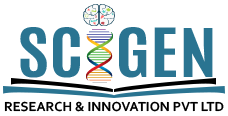
SCIGEN Research & Innovation has it’s in-house research and training facilities in support of its overall competency. The R&D capability of SCIGEN is the vital factor for its tremendous growth. Our R&D system works to enhance the quality of environment and life. With the team of expert scientists from various backgrounds of life sciences, our R&D effort is directed towards innovation and scientific breakthrough in current trends of research. Our R&D is a one-stop multidisciplinary centre equipped with state of the art facilities and diagnostic kits for research in the areas of medical and life sciences such as pharmacology, immunology, biochemistry, enzyme technology, molecular biology and health sciences. We maintain GLP for all the R&D services, with sophisticated instruments for the development of pioneer innovation in the field of Biotechnology and Medical science research. Our resources for R&D are strict of highest quality and consent with no defect to the environment.
OUR CURRENT RESEARCH PROJECTS AND AREAS OF INTEREST
- Anticancer and anti-proliferative studies on human lung, colon and breast cancer cell lines through signaling prevention
- Neuroinflammatory prevention in BV-2 microglial cells and related mechanisms of downstream regulators
- In-vivo anti-diabetic animal model studies with targeted therapeutic approach for prevention of disease progression
- Pharmaceutical chemistry of pure compounds on in-vivo animal model studies and the possible mechanism of action
- Pharmaceutical and nutraceutical diagnostic kit and bioproduct development with therapeutic potentials
- Contractual research projects for various local and international organizations
DIABETES RESEARCH WORK
According to WHO estimation, over 275 million persons would be affected by Diabetes with or without its complications worldwide and 75 million will be in India.
In SCIGEN research and innovation, we address key components of diabetes and we carry out therapeutic targeted approach to prevent diabetes effectively.
At present, by the time diabetes is recognized with the increased presence of glucose in blood and urine, the complications of Diabetes which are needed to be addressed to the society, trough our research work we will find a permanent solution to disease.
Therefore we started looking at therapeutically targeted research in order to reduce the diabetic resistance and to bring new hope and sophisticated path in the diabetic field of research.
CANCER RESEARCH AND PRECLINICAL STUDIES
According to GLOBOCAN 2012 (IARC), estimated, there were 14.1 million new cancer cases, 8.2 million cancer deaths and 32.6 million people living with cancer (within 5 years of diagnosis) in 2012 worldwide. 57% (8 million) of new cancer cases, 65% (5.3 million) of the cancer deaths and 48% (15.6 million) of the 5-year prevalent cancer cases occurred in the less developedregions.
Cancer is the most dangerous disease worldwide, the majority of cancers are due to genetic mutation, some 90–95% of cases, are due to genetic mutations from environmental factors. The remaining 5–10% are due to inherited genetics.
Environmental, as used by cancer researchers, means any cause that is not inherited genetically, such as lifestyle, economic and behavioral factors and not merely pollution. Common environmental factors that contribute to cancer death include tobacco (25–30%), diet and obesity (30–35%), infections (15–20%), radiation (both ionizing and non-ionizing, up to 10%), stress, lack of physical activity and pollution
Our research goal is to Understand key signaling pathways in cancer. By conducting preclinical in-vivo studies preventing the signaling in cancer induction using cell line studies we can able to overcome the severity of any type of human cancer.
We aim to develop an effective therapeutic method to suppress the signaling pathway of cancer using animal cell line. Early detection of cancer greatly increases the chances for successful treatment, SCIGEN has started a new strategic approach in the field of cancer studies.
NEUROINFLAMMATORY RESEARCH
Neuroinflammation is widely regarded as chronic, as opposed to acute, inflammation of the central nervous system. Acute inflammation usually follows injury to the central nervous system immediately and is characterized by inflammatory molecules. Chronic inflammation is the sustained activation of glial cells and recruitment of other immune cells into the brain. It is chronic inflammation that is typically associated with neurodegenerative disease such as, Parkinson’s disease (PD), is a long-term degenerative disorder of the central nervous system that mainly affects the motor system. Early in the disease, the most obvious are shaking, rigidity, slowness of movement, and difficulty with walking. Thinking and behavioral problems may also occur.
Alzheimer’s disease (AD), is a chronic neurodegenerative disease that usually starts slowly and worsens over time. It is the cause of 60–70% of cases of dementia. The most common early symptom is difficulty in remembering recent events (short-term memory loss). As the disease advances, symptoms can include problems with language, disorientation (including easily getting lost), mood swings, loss of motivation.
We believe that knowledge about microglial cell communication, prevention of inflammatory response will be an important part of a future treatment of neurodegenerative diseases.
STEM CELL RESEARCH
Stem Cell Research is the major forum for translational research into stem cell therapies Stem Cell Biology is one of the most promising areas of biomedical research which has a potential to alleviate or rather solve many of the present burdensome diseases.
According to the National Institutes of Health (NIH), stem cells are being considered for a wide variety of medical procedures, ranging from cancer treatment to heart disease and cell-based therapies for tissue replacement. Blood stem cells are currently the most frequently used stem cells for therapy. In SCIGEN, the potential of stem cells in therapeutic applications is being studied.

